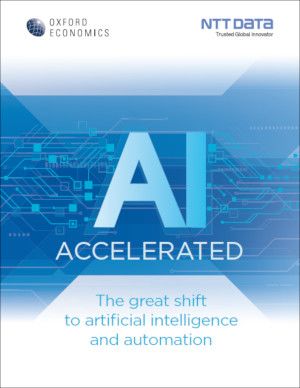Ungated Post | 20 Oct 2020
AI Accelerated: The great shift to artificial intelligence and automation

2020 has been a year of trend acceleration. Organizations already under pressure to rapidly rethink processes, products, and services to stay competitive in the digital economy suddenly had to make those innovations happen overnight as the COVID-19 pandemic and widespread social unrest called everything into question, from business models to talent strategies.
At the heart of these big changes is the set of emerging technologies enabled by artificial intelligence (AI). To understand progress toward AI implementation in North America, Oxford Economics and NTT DATA surveyed 1,000 executive and non-executive employees across industry sectors about their current and planned tactics for organizational transformation.
This research was conducted in early 2020, largely before the onset of the COVID-19 pandemic, and shows that most companies were not using AI at scale when the world changed. The data also points to essential next steps on the AI journey as companies respond to the new business environment, and identifies where early leaders are seeing returns on their investments.
Read the report
View the infographic
View the video
Our Thought Leadership team produces original, evidence-based research made accessible to decision-makers and opinion leaders. Principals for this project included:
Oxford Economics’ team is expert at applying advanced economic tools that provide valuable insights into today’s most pressing business, financial, and policy issues.
To find out more about our capabilities, contact:
EMEA
Paul Donnelly
020 3910 8000
Email
Americas
Diantha Redd
+1 (646) 503 3052
Email
Asia
Christie Tang
+852 3974 8841
Email
Related Services

Post
The economic impact of abandoning the WTO
Oxford Economics have been commissioned by the International Chamber of Commerce (ICC) to provide an independent assessment of the economic impact of WTO dissolution. This report details our findings and the assumptions underpinning our analysis.
Find Out More
Post
The economic impact of the sports activities of public service media
This study shows how the sports activities of public service media supported €4.5 billion of GDP and 57,000 jobs across 31 European countries in 2022. The report also highlights wider economic benefits of public service media sports coverage, such as the way in which it leverages sponsorship income for sports bodies.
Find Out More
Post
Global Trade Education: The role of private philanthropy
Global trade can amplify economic development and poverty alleviation. Capable leaders are required to put in place enabling conditions for trade, but currently these skills are underprovided in developing countries. For philanthropists, investing in trade leadership talent through graduate-level scholarships is an opportunity to make meaningful contributions that can multiply and sustain global economic development.
Find Out More